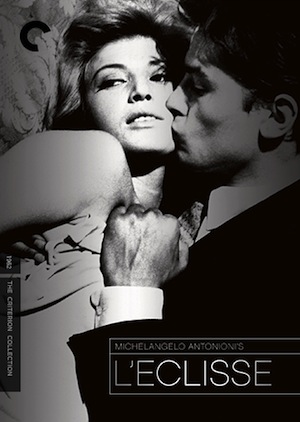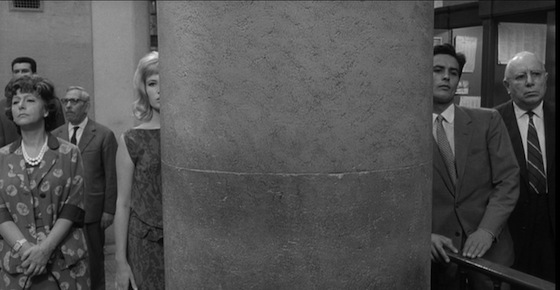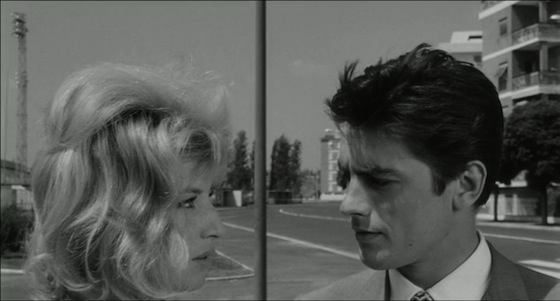It would be wrong to describe Michelangelo Antonioni‘s 1962 film L’eclisse, out now in a dual-format Blu-ray-DVD combo pack from The Criterion Collection, as impenetrable.
Impenetrable movies leave one mystified, asking “What’s the point?” The exact point of L’eclisse — if you wanted to dissect it to a tee — could be interpreted many different ways, of course. It can’t be boiled down to a singular thesis, thanks God. But the mood, the feeling of the piece, is obvious: Alienation.
Yes, I called it a “piece.” It’s difficult even to write about this movie, produced at the height of intellectual art cinema in the early 60s, without adopting a pretentious tone.
The third in a thematic trilogy of movies that began with 1960’s L’avventura and 1961’s La notte, L’eclisse spends time with Vittoria (Monica Vitti, the director’s muse, who played different characters in the first two films), a woman who works in Rome as a translator.
After an awkward (lack of) conversation with several starts and stops, she and her writer boyfriend (Francisco Rabal) break off their relationship. The camera lingers on objects in the foreground. Vittoria seems to wander aimlessly from one part of the room to the other like a pinball machine in slow motion. Eventually she ends up trying to get her mother’s attention on the floor of the stock exchange, the setting of which is the opposite of her demeanor before — all energy, noise, and flailing limbs.
She meets a young stockbroker named Piero (Alain Delon), and although it seems right away that the two will end up in some kind of courtship, Antonioni leaves him behind for the time being and follows Vittoria through a series of moments that reinforce her alienation. The effect on the viewer is the same, although a sequence at an airport that sends her spirits higher is a welcome one.
L’eclisse is a tough watch. Its challenging narrative is free of any real plot, and when one seems to intrude (a drunk driver steals Piero’s car), its resolution is fast and disconcerting. Piero’s reaction is even more disconcerting, and Antonioni finally seems to be deriving thematic resonance from something other than visual cues.
After two hours of space between people and space between objects and people, Piero and Vittoria embrace. But it’s stilted, forced. Or is it? Then comes a promise, followed by one of the more famous endings in art-house cinema: a seven-minute sequence that some theaters reportedly spliced right out of the movie on its original theatrical run because they thought it was so baffling. It makes perfect sense within the rest of L’eclisse and brings the film to a close perfectly, with the equivalent of a big-city eclipse: a streetlight close-up that blots out the sky.
Bonus features on this double-disc delight are illuminating, on par with other Criterion releases: a 56-minute documentary from 2001 called Michelangelo Antonioni: The Eye That Changed Cinema, a 22-minute interview from 2005 about Antonioni and L’eclisse featuring Italian film critic Adriano Aprà and longtime Antonioni friend Carlo di Carlo, and an audio commentary by film scholar Richard Peña.











Comments on this entry are closed.